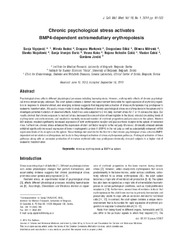Приказ основних података о документу
Chronic psychological stress activates BMP4-dependent extramedullary erythropoiesis
| dc.creator | Vignjević, Sanja | |
| dc.creator | Budeč, Mirela | |
| dc.creator | Marković, Dragana | |
| dc.creator | Đikić, Dragoslava | |
| dc.creator | Mitrović, Olivera | |
| dc.creator | Mojsilović, Slavko | |
| dc.creator | Vranješ-Đurić, Sanja | |
| dc.creator | Koko, Vesna | |
| dc.creator | Beleslin-Čokić, Bojana | |
| dc.creator | Čokić, Vladan | |
| dc.creator | Jovčić, Gordana | |
| dc.date.accessioned | 2021-04-20T12:39:30Z | |
| dc.date.available | 2021-04-20T12:39:30Z | |
| dc.date.issued | 2014 | |
| dc.identifier.issn | 1582-1838 | |
| dc.identifier.uri | http://rimi.imi.bg.ac.rs/handle/123456789/575 | |
| dc.description.abstract | Psychological stress affects different physiological processes including haematopoiesis. However, erythropoietic effects of chronic psychological stress remain largely unknown. The adult spleen contains a distinct microenvironment favourable for rapid expansion of erythroid progenitors in response to stressful stimuli, and emerging evidence suggests that inappropriate activation of stress erythropoiesis may predispose to leukaemic transformation. We used a mouse model to study the influence of chronic psychological stress on erythropoiesis in the spleen and to investigate potential mediators of observed effects. Adult mice were subjected to 2hrs daily restraint stress for 7 or 14 consecutive days. Our results showed that chronic exposure to restraint stress decreased the concentration of haemoglobin in the blood, elevated circulating levels of erythropoietin and corticosterone, and resulted in markedly increased number of erythroid progenitors and precursors in the spleen. Western blot analysis revealed significantly decreased expression of both erythropoietin receptor and glucocorticoid receptor in the spleen of restrained mice. Furthermore, chronic stress enhanced the expression of stem cell factor receptor in the red pulp. Moreover, chronically stressed animals exhibited significantly increased expression of bone morphogenetic protein 4 (BMP4) in the red pulp as well as substantially enhanced mRNA expression levels of its receptors in the spleen. These findings demonstrate for the first time that chronic psychological stress activates BMP4-dependent extramedullary erythropoiesis and leads to the prolonged activation of stress erythropoiesis pathways. Prolonged activation of these pathways along with an excessive production of immature erythroid cells may predispose chronically stressed subjects to a higher risk of leukaemic transformation. | en |
| dc.publisher | Wiley, Hoboken | |
| dc.relation | info:eu-repo/grantAgreement/MESTD/Basic Research (BR or ON)/175053/RS// | |
| dc.rights | openAccess | |
| dc.source | Journal of Cellular & Molecular Medicine | |
| dc.subject | stress | en |
| dc.subject | erythropoiesis | en |
| dc.subject | BMP4 | en |
| dc.subject | spleen | en |
| dc.title | Chronic psychological stress activates BMP4-dependent extramedullary erythropoiesis | en |
| dc.type | article | |
| dc.rights.license | ARR | |
| dc.citation.epage | 103 | |
| dc.citation.issue | 1 | |
| dc.citation.other | 18(1): 91-103 | |
| dc.citation.spage | 91 | |
| dc.citation.volume | 18 | |
| dc.identifier.doi | 10.1111/jcmm.12167 | |
| dc.identifier.fulltext | http://rimi.imi.bg.ac.rs/bitstream/id/440/572.pdf | |
| dc.identifier.pmid | 24283209 | |
| dc.identifier.scopus | 2-s2.0-84891371102 | |
| dc.identifier.wos | 000328951400009 | |
| dc.type.version | publishedVersion |

